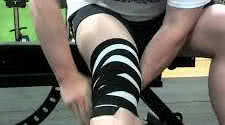Knee Wrapping - Wrapping Your Knees May Not Be the Best Answer

Prevention is Always the Best Medicine.. Including in Body Building
Basically, the use of knee wraps has been popularized by power lifters squatting tons of weight; the
rationale for using wraps is that they'll protect your knees from injury. Though squatting was believed to
be bad for your knees many years ago, subsequent research has proven squatting to actually he good for your
knees. Of course, by wrapping your knees tightly you'll end up able to squat more weight, which might be
some people's primary reason for using them. In the average scenario, one can squat an immediate 35 pounds
more by wrapping my knees.
Some general concerns maybe different. If your knee problem was centered around a common area
anterior/posterior cruciate ligament, meniscus or tendon - you should be mainly concerned with strengthening
your weaker knee to a degree where it matches the strength of your healthy knee.
Says William Post, MD, assistant professor and chief of sports medicine and shoulder surgery in the
department of orthopedics at West Virginia University School of Medicine in Morgantown, "For patients and
athletes to return to their desired activity level, their rehabilitated strength and flexibility must often
exceed the pre-injury level, since that level was inadequate to support the original loads imposed," What
this basically means is that you need to pump iron with the goal of getting bigger and stronger, But Post
goes on to say, "'The co-contractions [of all muscles involved] and weight-bearing loads associated with
closed-chain activities [such as squatting[ tend to he tolerated better than open- chain exercise [like leg
extensions] in most patients with patella femoral disorders."
So, now that you know you should indeed train and can also squat, how do you best go about it? This may come
as a surprise: Using knee wraps is probably counterproductive in your case, particularly if you wrap only
the previously injured knee. What you end up doing is providing artificial support to the knee, robbing its
supportive structures of the stimulus needed to grow stronger.
Richard T. Herrick, MD, an orthopedic surgeon and actively competing masters weightlifter and power lifter,
explains: "The use of wraps isn't even needed in instances of knee rehabilitation. However, if you feel the
need to increase warmth to the area, using a knee sleeve can be a good thing to do. If you feel there's a
significant degree of strength imbalance between the knees, you need to pay particular attention to not
shifting the emphasis to the stronger leg. If you can, work through the entire range of motion; if not, just
go as deep as you can pain-free and slowly work your way down to a full squat over time."
Herrick advises starting with a weight with which you can do three sets of 10 reps, then increasing it. Once
you can complete another three sets of 10, increase the weight again. After the imbalance subsides, you can
slowly begin to hit the weights even harder.
A lot of knee injuries can be traced back to overwork. In our zeal to get as big and strong as possible, we
often overlook the value of rest. When that happens, our bodies aren't able to recuperate to the degree
necessary for subsequent training sessions. An added dilemma is that when your body gets tired, technique
tends to falter, This is the perfect prescription for injury. To avoid it, be sure you allow for sufficient
rest between workouts - at least three days before hitting the same bodypart again.
Also consider lowering the volume and intensity of your work periodically to allow sufficient rest, and think
technique, technique, technique. You should also incorporate various stretches into your program. By ensuring
that your quads and hamstrings are flexible and able to functionally work through the full range of motion,
you'll give your knees additional tools for getting stronger and more balanced. And talking about hamstrings,
training them is very important because they play a vital role in balancing your thigh strength and preventing
injury.
Bottom line, knee wraps aren't needed to strengthen your knee and can actually be counterproductive. Save the
knee wraps for when your knee is completely healed and as strong as the other one and you decide to push some
very heavy weights.